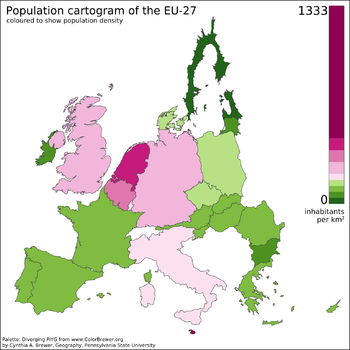Definition Population Density:
Population density is a measurement of population per unit area or unit volume. Population density refers to the number of people who live in a certain area. This can tell you how crowded the area is.
It is frequently applied to living organisms and most of the time to humans. Population
Density is a key geographical term.
Human population density
For humans, population density is the number of people per unit of area, usually quoted per square kilometer or square mile (which may include or exclude, for example, areas of water or glaciers). Commonly this may be calculated for a county, city, country, another territory, or the entire world.
How to workout population of an area?
divided by the total area is sq km (km2).
For example
to calculate the population density of the western cape which has a population of 6,016,900 and an area of 129,462 km2:
=6,016,900 ÷ 129,462 = 46,476
so the western cape has a population density of approximately 46 people per km2
Population of South Africa's provinces
Since the election of 27 April 1994, South Africa has been divided into nine provinces. They vary widely in population, from the mostly-urban Gauteng, which contains over 20% of the national population, to the mostly-desert Northern Cape, which contains less than 3%. The following table shows the provincial populations according to the 2011 National Census[1] and the most recent mid-year population estimate by Statistics South Africa.[2]
| Rank | Province | 2011 census | 2015 mid-year estimate | ||
|---|---|---|---|---|---|
| Population | Percentage | Population | Percentage | ||
| 1 | Gauteng | 12,272,263 | 23.7 | 13,200,300 | 24.0 |
| 2 | KwaZulu-Natal | 10,267,300 | 19.8 | 10,919,100 | 19.9 |
| 3 | Eastern Cape | 6,562,053 | 12.7 | 6,916,200 | 12.6 |
| 4 | Western Cape | 5,822,734 | 11.2 | 6,200,100 | 11.3 |
| 5 | Limpopo | 5,404,868 | 10.4 | 5,726,800 | 10.4 |
| 6 | Mpumalanga | 4,039,939 | 7.8 | 4,283,900 | 7.8 |
| 7 | North West | 3,509,953 | 6.8 | 3,707,100 | 6.7 |
| 8 | Free State | 2,745,590 | 5.3 | 2,817,900 | 5.1 |
| 9 | Northern Cape | 1,145,861 | 2.2 | 1,185,600 | 2.2 |
| South Africa | 51,770,561 | 100.0 | 54,956,900 | 100.0 | |



No comments:
Post a Comment